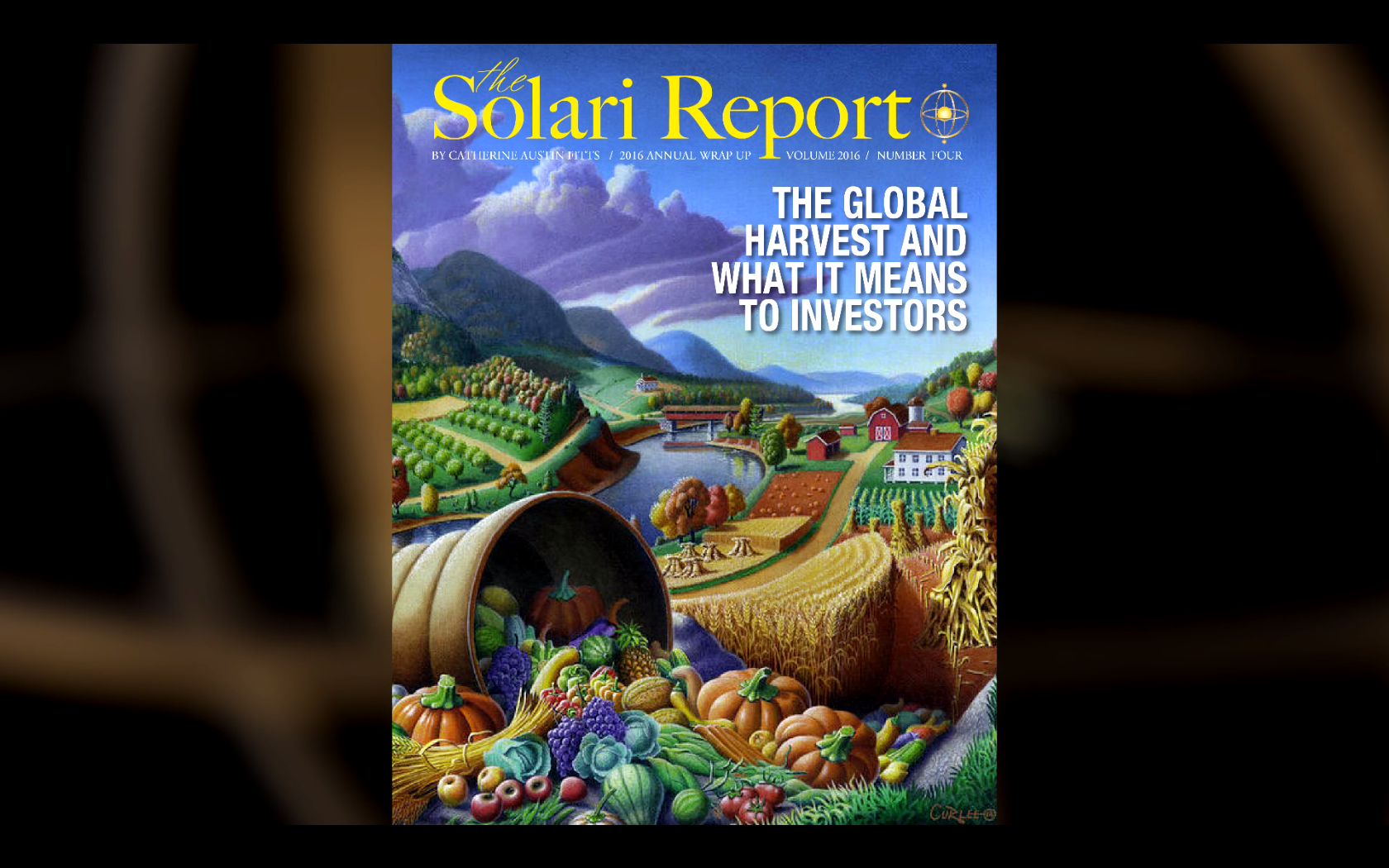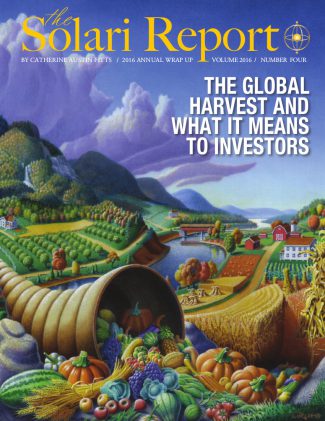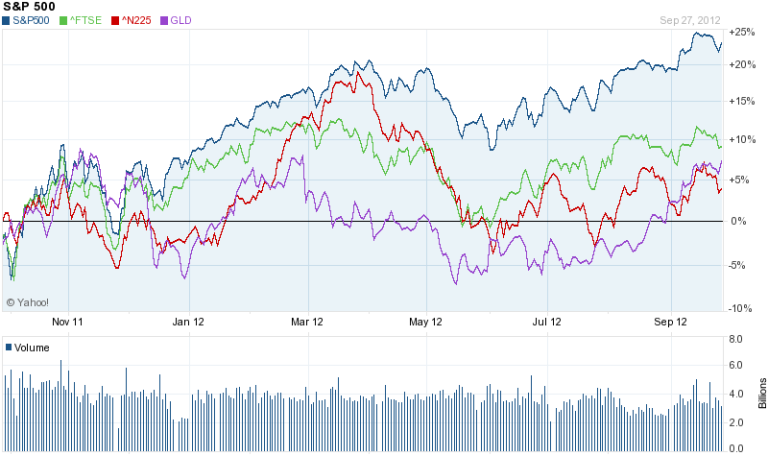“If GATT succeeds and we are able to impose modern methods of agriculture worldwide, so as to bring them to the level of Canada or Australia, what will happen? 2.1 billion people will be uprooted from the land and chased into the towns throughout the world. It is the single greatest disaster [in our history], greater than any war. We have to change priorities…If not, and we chase 2.1 billion people into the slums of the towns, we will create on a scale unheard of mass migration…We would be creating mass waves of migration which none of us could control.” ~ Sir James Goldsmith, 1994 Globalization Warning
Read the Web Presentation
Read the written presentation of the 2016 Annual Wrap Up here.
Read the Flipbook
Read the Flipbook of the 2016 Annual Wrap Up here.
Read the Digital Magazine PDF
Click to download/view the PDF.
Listen to the Wrap Up MP3 audio file
Download the Wrap Up audio file
By Catherine Austin Fitts
This week on the Solari Report, I shall present the final part of the 2016 Annual Wrap Up – The Global Harvest and What It Means to Investors.
We all have a personal, intimate connection with food. We shop, we cook, and some of us garden, and we all eat.
We rarely focus our attention, however, on the powerful role that agriculture plays in global geopolitics or economic warfare. A review of work force or GDP in 2015 indicates that agriculture constituted a relatively small percentage. For example, agriculture as a percentage of GDP was 1.3% in the United States, 1.6% in the Euro area and 5.34% in East Asia. These figures compare with a percentage for industry as a percentage of GDP in the US, Euro area and East Asia of 20.7%, 24.3% and 34.5% respectively.
Most of us are more likely to know someone in information technology, energy,or real estate than in farming.
Food, however, is that essential good with a powerful, inelastic demand, which drives so many other fundamentals. This fact is one of the reasons I was thrilled when Harry Blazer agreed to produce the Solari Report Food Series. If we are going to be succeed at building a human society, as opposed to an inhuman society, we have to get the agricultural model and food right. Indeed, one of the reasons that the US unipolar implementation of a “new world order” has failed is that it included a vision for centrally controlled global agriculture that has failed. Now we need to find the right agriculture and economic models that will work in a multipolar world.
The goal of our discussion this week is to help you to understand the role of food in the emerging battle over the political and economic models we will adopt as the shift to a global economy and a multiplanetary civilization continues. These insights will help you understand:
- the political and economic battles raging around us; and,
- the power of taking steps in our own lives to increase the chances that we and our children will live in a human culture and healthy environment. (See the “Popsicle Index Rising” scenario in the 2017: Get Ready, Get Ready, Get Ready section accessible in the 2016 Annual Wrap Up web presentation – see link in the Subscriber Links section of this and the last three weeks commentaries.)
In Let’s Go to the Movies, please watch Sir James Goldsmith’s 1994 globalization warning. It is the single most prophetic description of what has been happening globally since the institution of the Uruguay Round of GATT and the World Trade Organization. If you want to understand the geopolitical and economic role of food in the world economy today, it is a must watch. No one else has communicated the importance of aligning culture, economy, and environment better than Goldsmith, whose business career involved extensive holdings and deep understanding of global agriculture and food distribution.
Talk to you Thursday!







Hi TechTeam,
The Flip Book says it’s ready for this Annual Wrap Up, and I think I was able to access it in the past, but now it just takes me to the ‘black hole’ page. Thanks, Colleen
Colleen:
My apologies. I just found your comment. I have asked our team to fix. They are on it and will e-mail you when it is fixed.
Thanks,
Catherine
Hi Catherine, I just signed up for your report after watching you on Open Minds with Regina Meredith. I’m very excited about digging through all the information you have posted.
I am trying to locate the video of the 2016 Annual Wrap-Up but only see audio files and PDFs. I apologize to bother you about this, but could you (or anyone) please tell me exactly where the link is to the video on the page above?
Thanks in advance.
PJ
Patsy-Joyce:
Welcome to the Solari Report!
Each commentary has a short excerpt video. There were four for the annual wrap up:
https://solari.com/blog/2016-annual-wrap-up-news-trends-stories-part-i/
https://solari.com/blog/2016-annual-wrap-up-news-trends-stories-part-ii/
https://solari.com/blog/annual-wrap-up-equity-overview-rambus-blockbuster-chartology/
https://solari.com/blog/2016-annual-wrap-up-the-global-harvest-and-what-it-means-to-investors/
All the Solari Reports come with a commentary with an excerpt video and then the full interview in audio and transcript.
If you just signed up for a six month, you will be getting a hard copy as a complimentary which will be mailed out next week.
We also posted a flip book today for the annual wrap up.
I am glad you are starting with the wrap Ups.
Catherine
Thanks, Allison! Will check it out.
Catherine. One of your finest presentations. I am already sharing pieces of this (including the emergent placed-based food production ‘rethink logic and rationale’) with my own added thoughts with my global development colleagues who ‘grew up’ professionally in the late 80’s and 90’s. All the best,
Addendum. In global food policy circles, root cause analyses will implicate food security as an outcome of 1) climate change, 2) the explosion of population, and, 3) to a lesser degree, war and political corruption at the national level (food distribution isssues). The conceptual model being floated among those setting global food policy at the UN, FAO, USAID, etc. and implementing global development interventions for consideration is that we are entering into the era of the anthropocene which posits that, “The stability of our infrastructure, the reliability of our production systems and the liveability of our cities will all be much less certain in the future. ” (see link to article below). An understanding of this model, its strengths and implications for what is happening at the local level is certainly warranted.
An excellent open access publication being floated in these circles provides the basic argument, framework and evidence base and is available below:
Gillings MR and EL Hagan-Lawson. The cost of living in the Anthropocene. Earth Perspectives. 2014, 1:2 . DOI: 10.1186/2194-6434-1-2
https://earth-perspectives.springeropen.com/articles/10.1186/2194-6434-1-2
Allison:
So glad you liked it. Even I was shocked at the variability present in the future scenarios. So it was truly back to basics.
Catherine
Dear Catherine,
Omigosh.
I was deeply saddened to watch this, to realize how right Sir James Goldsmith was, all those decades ago, about the terribly destructive and destabilizing effects of globalization upon so many – except the big multinational corporations. Thanks to the policy that worships the Economic Index as a god, and the imposition of this economic policy by government in collusion with their economic leaders upon all these countries, against the wishes of their own populations.
Practically everything he was warning about then has turned out to be true. He was a capitalist with a real conscience – so rare in today’s world of unmitigated greed and rapaciousness by the transnational corporations.
Thank you very much for highlighting this invaluable interview. I shall hunt down his book now. I hope it is still in print.
Teresa:
He was a great capitalist. Great capitalists appreciate that destroying humanity and society is bad for business. Along with my book at dunwalke.com it is proof positive that we have known exactly what we are doing and the harm that we would do.
Which once again raises the question of the real governance system – who is making these decisions and why?
Catherine